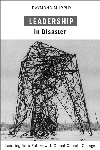
Leadership In Disaster: Learning For A Future With Global Climate Change
Raymond Murphy
McGill-Queen's University Press
$44.95
cloth
480pp
978-0-773535-244
The Swedes erred on the side of caution – a risk miscalculation of the more uncommon sort. Most people do not remember past crises for very long, so their willingness to prepare for the next time is usually minimal. When precedents are few in number or lacking altogether, people sit on their hands, weighing very real costs against possible benefits.
In Leadership in Disaster, Raymond Murphy examines how individuals and institutions fail to foresee disasters, and why strong leadership is crucial for preventing them – or at least lessening their social and environmental impacts. As a case study, he uses the 1998 Ice Storm, the biggest and costliest natural disaster to hit our region in recorded history.
Natural disasters, Murphy says, are situations where forces of nature overwhelm human structures and technology. A monsoon in the middle of the ocean, for example, does not qualify, unless there’s a boat or an oil derrick to capsize. All infrastructure, no matter how modernized, is only as strong as its biggest challenge, natural or otherwise. In fact, as technology becomes more sophisticated, and our reliance on it increases, susceptibility rises. Add to all that a higher projected number of strange weather events – the consequences of climate change -and leaders and citizens alike have a lot of thinking to do.
The Ice Storm exposed the inherent fragility of Quebec’s electrical grid, and proved once and for all how modern life utterly depends on reliable power. (As if to drive home the point, nearby off-the-grid, self-sufficient Amish communities continued more or less as normal.)
Lulled into complacency for years by Hydro-Québec’s assurances of invulnerability, our leaders never tested the sensitivity of major civil services to interrupted supply. The result was a near-total collapse of basics like water filtration. Transmission wires, strung above ground in rural areas (where they are too expensive to run underground) became the first casualties of successive bouts of freezing rain, and became time- and labour-intensive to repair. The South Shore’s “Triangle of Darkness” took weeks to restore to normal.
Strong leadership also means leading strongly. We expect a steady hand at the helm, dispensing the right amount of information at the right time, and directing assistance. Secrecy does not prevent panic; it makes it more probable. People who lack facts will invent them. Although people often self-organize in critical times, they still need guidance for coordinating efforts and reporting on the situation at large. And they really need financial and moral support when the crisis has passed. (It is interesting to note that of all regions affected, only Quebec did not declare a state of emergency, and never has in all its history.)
Murphy, a University of Ottawa emeritus professor of sociology, interviewed many participants in the crisis and its aftermath, and includes a wide range of opinion and theory in his analysis. That thoroughness is both the book’s strength and its weakness. As a study of the Ice Storm’s impacts, it is a valuable tool for policy-makers and social planners, and is clearly aimed at such a readership.
However, much of the truly thought-provoking material is too embedded in theoretical jargon (and general verbosity) to hold the lay reader’s interest. Surely this information could benefit voters also. After all, informed voters are better equipped to choose the leaders who may end up taking them through the next disaster – whatever and whenever that might be. mRb






0 Comments